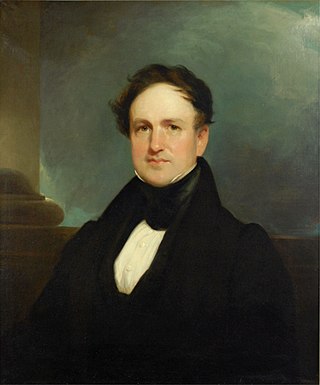Top Qs
Timeline
Chat
Perspective
Benjamin Chew Howard
American politician From Wikipedia, the free encyclopedia
Remove ads
Benjamin Chew Howard (November 5, 1791 – March 6, 1872)[1] was an American politician and lawyer. After serving on the city council of Baltimore in 1820 and in both houses of the Maryland legislature, he was a Representative in the United States Congress from 1829 to 1833, and from 1835 to 1839. He was thereafter the fifth reporter of decisions of the United States Supreme Court, serving from 1843 to 1860.
Remove ads
Early life and education
Howard was born at Belvidere in Baltimore County, Maryland, the son of John Eager Howard and Margaret ("Peggy") Chew, daughter of Benjamin Chew. He received an A.B. from Princeton University in 1809.[2] In 1812 he attended and graduated from Litchfield Law School in Connecticut.[3]
War of 1812
During 1814, the last year of the War of 1812 he served as a Captain in the First Mechanical Volunteers, a company of the 5th Maryland Regiment at the Battle of North Point. The battle would become the turning point of the War.[4] He remained in the service and later he reached the rank of brigadier general in the Maryland militia.[2]
Remove ads
Marriage and family

Among his siblings were George Howard, Governor of Maryland; Dr. William Howard, a civil engineer and architect; and Charles who with his son Francis Key Howard, were imprisoned in Fort McHenry at the start of the American Civil War. In 1818 he married Jane Gilmor who would write a charity cookbook and after the Civil War lead a successful fundraising fair. They had twelve children.[5]
Remove ads
Political life
Summarize
Perspective
A Democrat, he served on the city council of Baltimore in 1820 and in both houses of the Maryland legislature. He was elected to the Twenty-first and Twenty-second United States Congress, serving from March 4, 1829 to March 3, 1833. In 1835, President Andrew Jackson named Richard Rush and Howard to arbitrate the Ohio-Michigan boundary dispute.[1]
He returned to Congress in the Twenty-fourth Congress and was re-elected to the Twenty-fifth, serving from March 4, 1835, to March 3, 1839. During this service, he chaired the House Foreign Relations Committee for four years.
In 1861, he was one of the emissaries sent by outgoing President James Buchanan to try to secure a peace with the Confederacy. That year he unsuccessfully ran for Governor of Maryland. He died in Baltimore at his home on March 6, 1872 and is buried in Greenmount Cemetery.[1]
United States Reports
Starting with the 42nd volume of United States Reports, Howard was the Reporter of Decisions of the Supreme Court of the United States, serving from 1843 to 1860. His term covered volumes 42 through 65 of US Reports, corresponding to volumes 1 through 24 of his nominative Howard's Reports. As such, the dual form of citation to, for example, the Supreme Court decision in Williams v. United States is 42 U.S. (1 How.) 290 (1843).
See also
References
External links
Wikiwand - on
Seamless Wikipedia browsing. On steroids.
Remove ads

